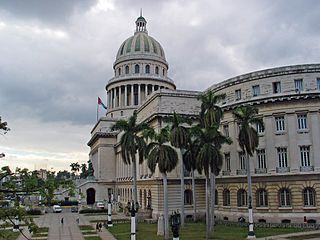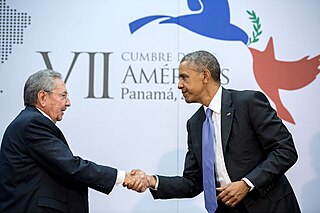Investigative journalism is a form of journalism in which reporters deeply investigate a single topic of interest, such as serious crimes, racial injustice, political corruption, or corporate wrongdoing. An investigative journalist may spend months or years researching and preparing a report. Practitioners sometimes use the terms "watchdog reporting" or "accountability reporting".

The United States embargo against Cuba has prevented U.S. businesses from conducting trade or commerce with Cuban interests since 1958. Modern diplomatic relations are cold, stemming from historic conflict and divergent political ideologies. U.S. economic sanctions against Cuba are comprehensive and impact all sectors of the Cuban economy. It is the most enduring trade embargo in modern history.

The National Security Archive is a 501(c)(3) non-governmental, non-profit research and archival institution located on the campus of the George Washington University in Washington, D.C. Founded in 1985 to check rising government secrecy. The National Security Archive is an investigative journalism center, open government advocate, international affairs research institute, and the largest repository of declassified U.S. documents outside the federal government. The National Security Archive has spurred the declassification of more than 15 million pages of government documents by being the leading non-profit user of the U.S. Freedom of Information Act (FOIA), filing a total of more than 70,000 FOIA and declassification requests in its over 35+ years of history.

Lesbian, gay, bisexual, and transgender (LGBT) rights in Cuba have significantly varied throughout modern history. Cuba is now considered generally progressive, with vast improvements in the 21st century for such rights. Following the 2022 Cuban Family Code referendum, there is legal recognition of the right to marriage, unions between people of the same sex, same-sex adoption and non-commercial surrogacy as part of one of the most progressive Family Codes in Latin America. Until the 1990s, the LGBT community was marginalized on the basis of heteronormativity, traditional gender roles, politics and strict criteria for moralism. It was not until the 21st century that the attitudes and acceptance towards LGBT people changed to be more tolerant.

Cuba, officially the Republic of Cuba, is an island country, comprising the island of Cuba, Isla de la Juventud, and 4,195 islands, islets and cays surrounding the main island. It is located where the northern Caribbean Sea, Gulf of Mexico, and Atlantic Ocean meet. Cuba is located east of the Yucatán Peninsula (Mexico), south of both Florida and the Bahamas, west of Hispaniola, and north of Jamaica and the Cayman Islands. Havana is the largest city and capital. Cuba is the third-most populous country in the Caribbean after Haiti and the Dominican Republic, with about 10 million inhabitants. It is the largest country in the Caribbean by area.

Modern diplomatic relations between Cuba and the United States are cold, stemming from historic conflict and divergent political ideologies. The two nations restored diplomatic relations on July 20, 2015, after relations had been severed in 1961 during the Cold War. The U.S. has maintained a comprehensive trade embargo against Cuba since 1958. The embargo includes restrictions on all commercial, economic, and financial activity, making it illegal for U.S. corporations to do business with Cuba.

Mariela Castro Espín is the director of the Cuban National Center for Sex Education in Havana, as well as the National Commission for Comprehensive Attention to Transsexual People, and an activist for LGBT rights in Cuba. Castro is an outspoken advocate for the LGBT+ community as well as dissolving some of the antiquated stigmas and stereotypes that surround the community. She is the daughter of former Communist Party First Secretary Raúl Castro and feminist and revolutionary Vilma Espín, and the niece of former First Secretary Fidel Castro.
Censorship in Cuba is the topic of accusations put forward by several foreign groups-organizations and political leaders, as well as Cuban dissidents. The accusations led the European Union to impose sanctions from 2003 to 2008 as well as statements of protest from groups, governments, and noted individuals.
Same-sex marriage has been legal in Cuba since 27 September 2022 after a majority of voters approved the legalization of same-sex marriage in a referendum two days prior. The Constitution of Cuba prohibited same-sex marriage until 2019, and in May 2019 the government announced plans to legalize same-sex marriage. A draft family code containing provisions allowing same-sex couples to marry and adopt was approved by the National Assembly of People's Power on 21 December 2021. The text was under public consultation until 6 June 2022, and was approved by the Assembly on 22 July 2022. The measure was approved by two-thirds of voters in a referendum held on 25 September 2022. President Miguel Díaz-Canel signed the new family code into law on 26 September, and it took effect upon publication in the Official Gazette the following day.

The mass media in Cuba consist of several different types: television, radio, newspapers, and internet. The Cuban media are tightly controlled by the Cuban government led by the Communist Party of Cuba (PCC) in the past five decades. The PCC strictly censors news, information and commentary, and restricts dissemination of foreign publications to tourist hotels. Journalists must operate within the confines of laws against anti-government propaganda and the insulting of officials, which carry penalties of up to three years in prison. Private ownership of broadcast media is prohibited, and the government owns all mainstream media outlets.

Miguel Ángel Quevedo y de la Lastra was the publisher and editor of Bohemia, the most popular news-weekly in Cuba and the oldest Latin America, known for its political journalism and editorial writing.

Guillermo Fariñas Hernández is a Cuban doctor of psychology, independent journalist and political dissident in Cuba. He has conducted 23 hunger strikes over the years to protest various elements of the Cuban government and spent more than 11 years in prison. He vowed that he would die in the struggle against censorship in Cuba.
The Cuban government directly prevents access to certain websites. While preventing access to certain websites is present, it is not particularly extensive. Limited access to the Internet through limited internet infrastructure is the main problem with Internet access in Cuba.

Yoani María Sánchez Cordero is a Cuban blogger who has achieved international fame and multiple international awards for her critical portrayal of life in Cuba under its current government.

The Intercept is an American left-wing nonprofit news organization that publishes articles and podcasts online.
14ymedio is an independent digital media outlet in Cuba. It was founded on May 21, 2014, by the Cuban blogger and activist Yoani Sánchez and the Cuban journalist Reinaldo Escobar. The project started with a group of 12 reporters. The newspaper wrote news about Cuba and the world on topics related to politics, economy, society, science and technology, and sports. It also publishes editorials, opinion articles, and interviews.

The Cuban thaw was a normalization of Cuba–United States relations that began in December 2014, ending a 54-year stretch of hostility between the nations. In March 2016, Barack Obama became the first U.S. president to visit Cuba since Calvin Coolidge in 1928. The normalization of relations lasted from July 2015 to June 2017, with relations further deteriorating under Presidents Donald Trump, and later, Joe Biden.
Several independent Cuba-based digital media outlets offer alternative voices to censored state-run television, radio, and newspapers. Many of these new media ventures take the form of news outlets or webzines. These outlets may be used as platforms to critique the Socialist government, or to discuss issues or offer entertainment that the state-run media may ignore or consider taboo, such as sports and fashion.

Alexander Otaola Casal is a Cuban-American actor, social media influencer, comedian and political activist. Otaola is the host of the web show Hola Ota-Ola!, an informative and satirical program that covers entertainment, news and politics. His show debuted on Cubanos por el Mundo, a cross platform media initiative, website, and YouTube channel that covers politics, news, and celebrity culture in Cuba and the Cuban exile community. Otaola is a vocal opponent of the communist Cuban government, denouncing its human rights violations and crimes in all of his shows. In addition, in 2023, Otaola registered his candidacy to run in the 2024 Miami-Dade County mayoral election.

Abraham Jiménez Enoa is a freelance Cuban journalist. He is the co-founder of El Estornudo and was the recipient of the 2022 International Press Freedom Award.













